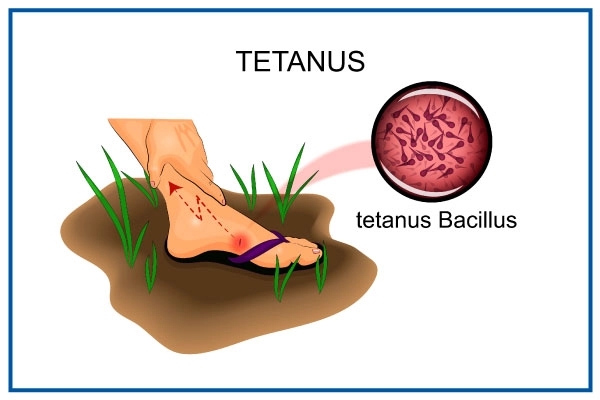What is Tetanus?
Tetanus, also called trismus, is a serious infection related to the nervous system. It is caused due to toxin-producing bacteria called Clostridium tetani. Breathing problems and muscle spasms are caused by this condition, particularly in the neck and jaw muscles. It is also known as Lockjaw.
Tetanus is a life-threatening disease and it is considered to be a risk for all wounds except small, clean cuts.

Symptoms of Tetanus
The average interval between wound infection and the onset of symptoms is ten days. The incubation phase might be anywhere between three and twenty-one days.
Generalized tetanus is one of the most prevalent kinds of tetanus. In the time period of 14 days, signs and symptoms steadily worsen. They normally affect the jaw and slowly move down in the body.
The following are signs and symptoms of tetanus disease:
- Muscle stiff and spasms, immobile muscles in the jaw.
- Muscle tension around your lips, sometimes resulting in a constant grin.
- Muscle spasms and tightness in the neck.
- Rigid abdominal muscles
- Swallowing difficulties
Tetanus infection progresses to cause severe, seizure-like spasms that continue for many minutes (generalized spasms). The back and neck usually arch, the knees stiffen, the arms are brought up to the body, and the fists are clenched. Breathing issues may result from muscle tightness in the neck and abdomen.
Other symptoms that may appear as the disease advances include:
Types of Tetanus:
- Generalized tetanus : It is a very common type of tetanus commonly seen in many patients. It affects all skeletal muscles and the infection mainly shows with a descending pattern. The first symptom is lockjaw or trismus, followed by neck stiffness, rigid abdominal muscles and difficulty in swallowing.
- Localized Tetanus : This rare variant of tetanus causes muscle pains near the site of a wound. While it is typically a milder form of the disease, it can proceed to widespread tetanus.
- Cephalic Tetanus : This uncommon form of tetanus is caused by a head wound. It causes facial muscle weakness and spasms of the jaw muscles. It can potentially lead to widespread tetanus.
- Neonatal tetanus : It is similar to generalized tetanus but affects infants younger than one month old (neonates). Neonatal tetanus is observed in infants born without having passive protective immunity, as the mother is not immune.
Causes of Tetanus
Clostridium tetani is the name of the bacteria that causes tetanus. The bacterium can live in soil and animal excrement in a latent form. It's basically shut down until it finds a place to thrive. When dormant bacteria enter a wound, which promotes growth, the cells become "awakened." They produce a poison called tetanospasmin as they grow and divide. The poison damages the nerves that control the body muscles.
Risk Factors of Tetanus
The most dangerous risk factor for tetanus infection is not being vaccinated or failing to receive ten-year booster doses. Other factors that increases the likelihood of tetanus infection include:
- Cuts or sores that have been exposed to soil or manure.
- A foreign body, such as a nail or splinter, in a wound.
- A medical history of immune-suppressing disorders.
- Diabetes patients with infected skin lesions.
- When a mother is not properly immunized, or her umbilical cord becomes infected.
- Unsanitary and shared needles for illegal drug use.
Diagnosis of Tetanus
Tetanus infection is diagnosed through a physical examination, medical and immunization history, and symptoms such as muscle spasms, rigidity, and discomfort. A laboratory test would most likely be conducted only if your doctor feels that the signs and symptoms are caused by anything else.
Treatment for Tetanus
Tetanus has no known treatment. A tetanus infection necessitates both emergency and long-term supportive care while the disease progresses. Wound care, symptom relief drugs, and supportive care are typically provided in an intensive care unit. The sickness lasts around two weeks, and recovery might take up to a month.
Wound treatment
Cleaning your wound with sterile or clean water and antiseptic solution is necessary to eliminate dirt, debris, or foreign items that may harbour bacteria. Your medical staff will also clean the wound of any dead tissues that could create a breeding ground for bacteria.
Medications
- Toxins that have not harmed nerve tissues are targeted with antitoxin therapy. This treatment, known as passive immunization, involves the administration of a human antibody against the toxin.
- Sedatives that slow the nervous system's action can assist manage muscle aches.
- Getting one of the usual tetanus vaccines helps your immune system fight against the toxins.
- Antibiotics, either orally or intravenously, may aid in the fight against tetanus germs.
- Other medicines may be used to control involuntary muscle activity, such as heartbeat and breathing. Morphine could be utilized for this as well as sedative.
- Toxins that have not harmed nerve tissues are targeted with antitoxin therapy. This treatment, known as passive immunization, involves the administration of a human antibody against the toxin.
- Sedatives that slow the nervous system's action can assist manage muscle aches.
- Getting one of the usual tetanus vaccines helps your immune system fight against the toxins.
- Antibiotics, either orally or intravenously, may aid in the fight against tetanus germs.
- Other medicines may be used to control involuntary muscle activity, such as heartbeat and breathing. Morphine could be utilized for this as well as sedative.
